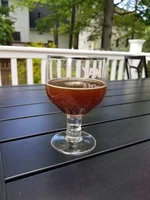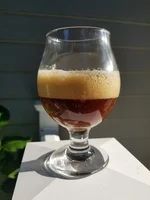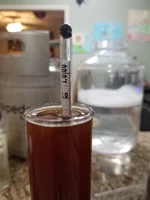Trick or Treat Bock (2021-04-17)
- Brewed: April 17, 2021
- Packaged: May 7, 2021
- On Tap: N/A
- Recipe: Trick or Treat Bock
I've been craving a good wheat beer lately, so it's time to brew a Weizenbock for my big beer on tap.
My efficiency was pretty bad this time, but it is not completely unexpected. I also had a higher boiloff rate than usual or higher grain absorption or possibly my change to my usual process, detailed below, is what threw everything off. I ended up with about 1/4 less wort than expected and it was a lower gravity.
Preboil SG: N/A
Original gravity: 1.076
Final gravity: 1.018
Volume in Fermenter: 2.45 Gallons
Mash and Boil Process
I changed things up slightly from my usual full volume BIAB. I knew that between the wheat and the large grain bill my efficiency would be low. To attempt to make up for that I mashed with 3.5 gallons of water instead of the full 4.75 to 4.85 gallons I would have used for a true full volume mash. I figured this would reduce the weight on my glass top stove, which I am pushing my luck with on many of my brews, and this was the heaviest yet due to the largest grain bill and enough water for a 90 minute boil. It also left me water to attempt to sparge with to see if that would improve my efficiency.
I mashed in at about 158F-160F and stirred for several minutes. I also came back after about 15 minutes to stir a bit more to ensure there were no clumps. After that I let everything sit for a total of a 60-70 minute mash which ended around 148F.
Close to the end of that time I heated my sparge water and stopped heating a little before boiling started. At the end of the mash period I squeezed the bag as much as I could as I usually do. Due to the large grain bill I could not squeeze every last bit of wort out like I can with my smaller beers. I attempted to dunk sparge, but my pot for that was way too small, so I ended up trying to pour sparge water over the bag with one hand while holding the bag up with the other. I suspect I lost a lot of efficiency there and may have also lost some liquid that was expected to be there. Since I was messing around, I forgot to grab a small sample for a pre-boil gravity reading.
After that I did a 90 minute boil, adding my hops after 30 minutes to give them a 60 minute boil. I picked up a small bag to keep the hops in this time to reduce the amount of trub that I pour into my fermenter at the end. I usually just pour everything in, but with these big beers I end up losing 1/2 gallon to trub and yeast, so I wanted to see if I could reduce my losses at all. About 10 minutes from the end I added a mixture of yeast energizer and yeast nutrient.
After cooling I transferred to my fermenter, shaking and aerating as much as possible while transferring before shaking some more after I had everything in the fermenter.
Fermentation
I pitched a full packet of T-58 at about 65 F and set my temperature controls to maintain that. I hope this will give a good balance of the esters and phenols. The reduced wort volume may work to my advantage here since every discussion about T-58 that I have read online talks about a massive fermentation and flooding airlocks and blowing out of blow out tubes.
2021-04-21
I have been tracking the fermentation visually as I usually do. There was little to nothing happening on Saturday night (the 17th). When I got up in the morning there was a large 1-2 inch thick krausen on top and junk on the upper inside of the fermenter which looked like the krausen had reached several inches high, taking the volume from about the 2.5 gallon mark all the way up to 3+ gallons. The temperature held consistent around 66F on Sunday and so I did not worry about ensuring I had ice for cooling overnight since the temperatures are still getting down into the 50s and even 40s overnight, but when I checked Monday morning the wort was around 73F, so the yeast were still very active. I refreshed ice for cooling and got temps back down to 65F-66F. The airlock continued bubbling at a constant, fairly rapid pace and krausen stayed fairly thick up through Tuesday night (2021-04-20). As of this morning the krausen has started to sink back in and the yeast is just barely beginning to settle, but it is still very cloudy with yeast today.
2021-05-08
I took a final gravity reading, kegged the beer, and began force carbonating on the 7th. I have just tasted a small sample around 3pm today and while I think some more aging will make it a lot better (which I expected, but I am impatient), I am happy with how this has turned out. It definitely has a very "belgian" taste from the T-58 yeast and so I am curious as to how different it would have turned out if I had used Munich Classic at closer to 62F-64F.
Style Details
| O.G. | F.G. | IBU | Color |
|---|---|---|---|
| 1.064 - 1.090 | 1.015 - 1.022 | 15 - 30 | 6 - 25 srm
|
Batch Details
| Brewed On | Packaged On | On Tap Date | Original Gravity | Final Gravity | Color |
|---|---|---|---|---|---|
| April 17, 2021 | May 7, 2021 | N/A | 1.076 | 1.018 | 22 srm |


